高中英语必修4课件:Unit 4 Body language Listening&Reading(共45张PPT)
文档属性
| 名称 | 高中英语必修4课件:Unit 4 Body language Listening&Reading(共45张PPT) | 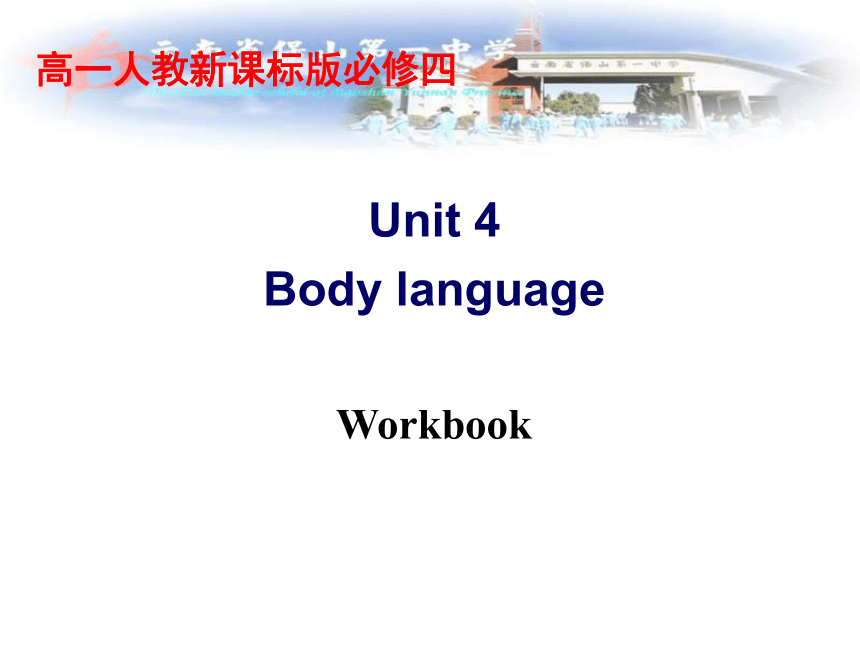 | |
| 格式 | zip | ||
| 文件大小 | 3.6MB | ||
| 资源类型 | 教案 | ||
| 版本资源 | 人教版(新课程标准) | ||
| 科目 | 英语 | ||
| 更新时间 | 2015-07-23 09:51:53 | ||
图片预览

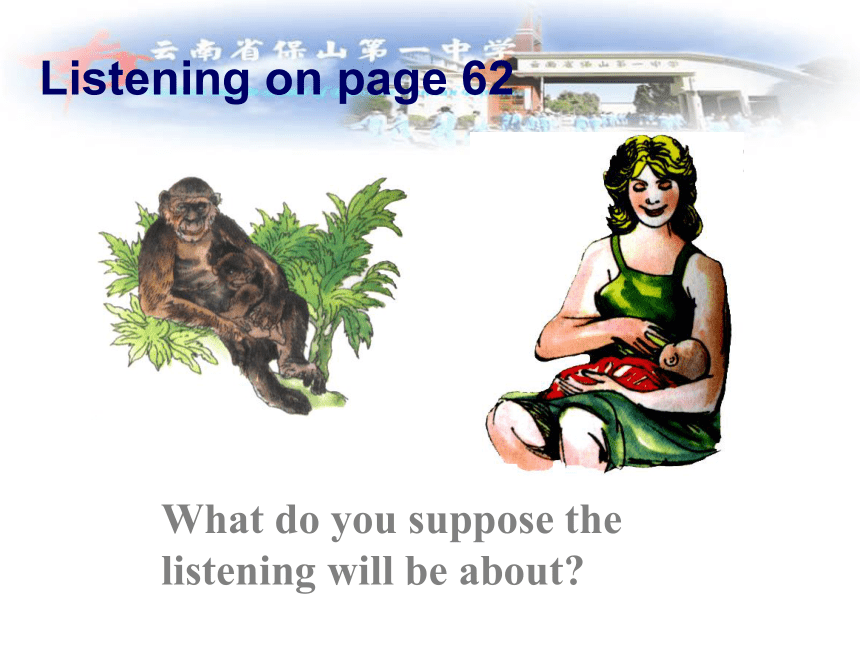
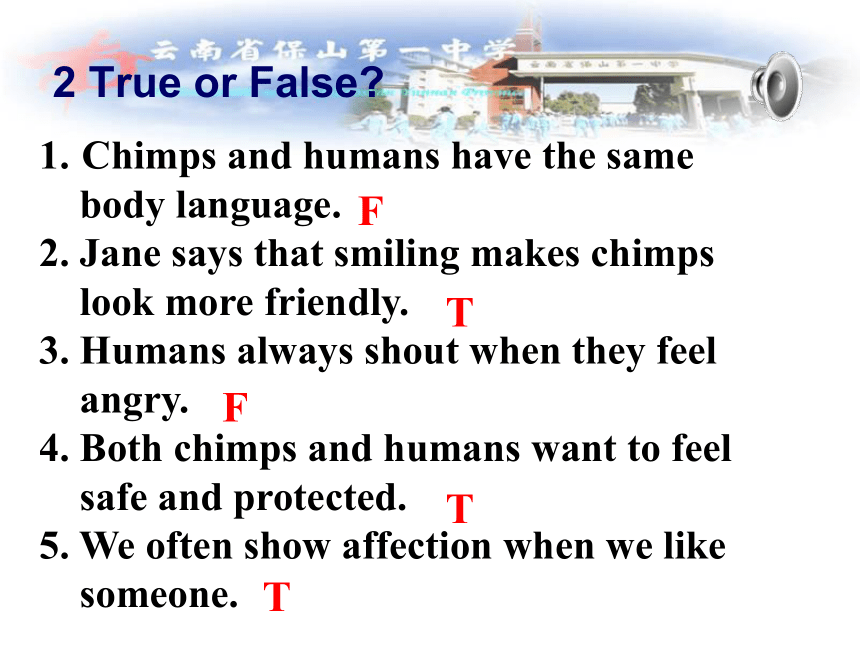
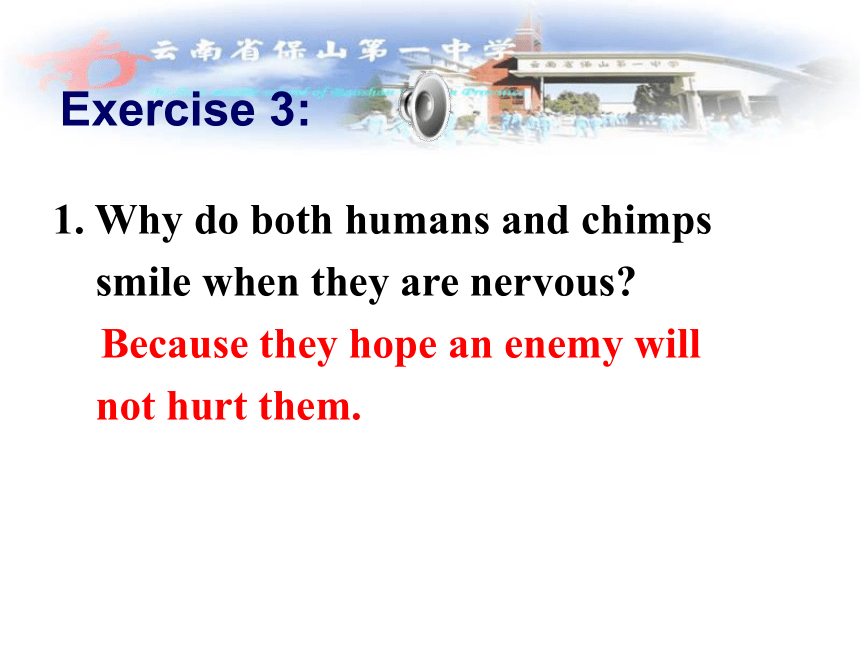
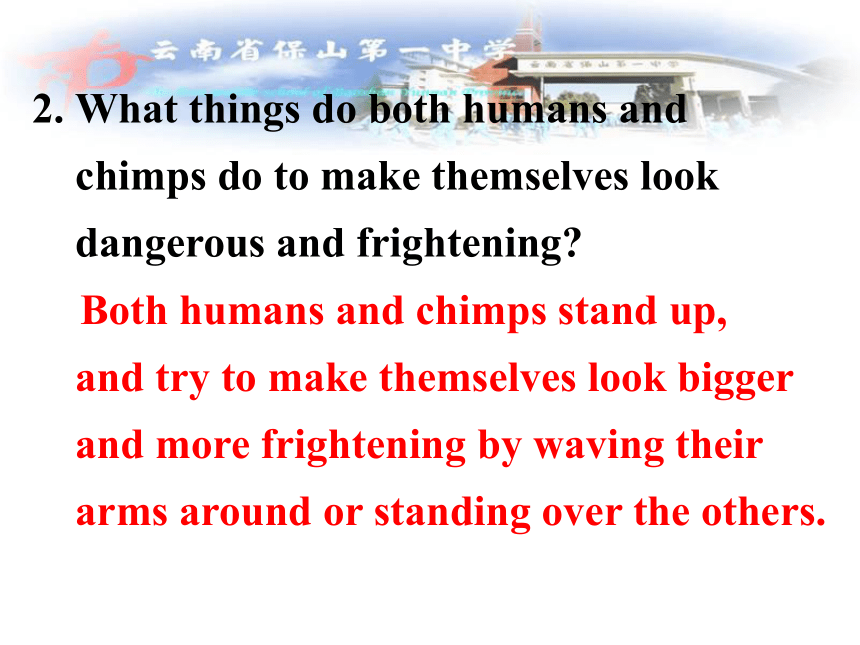
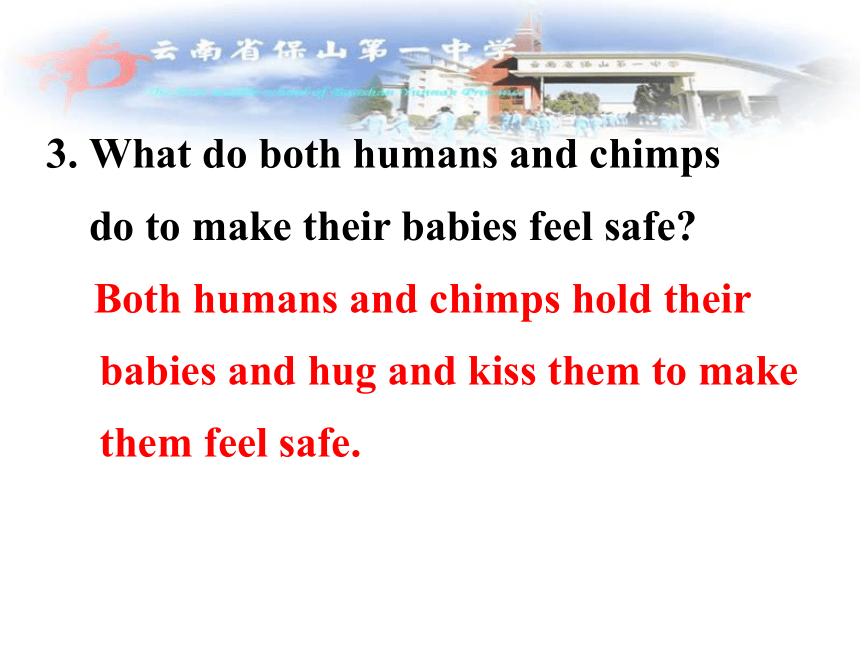
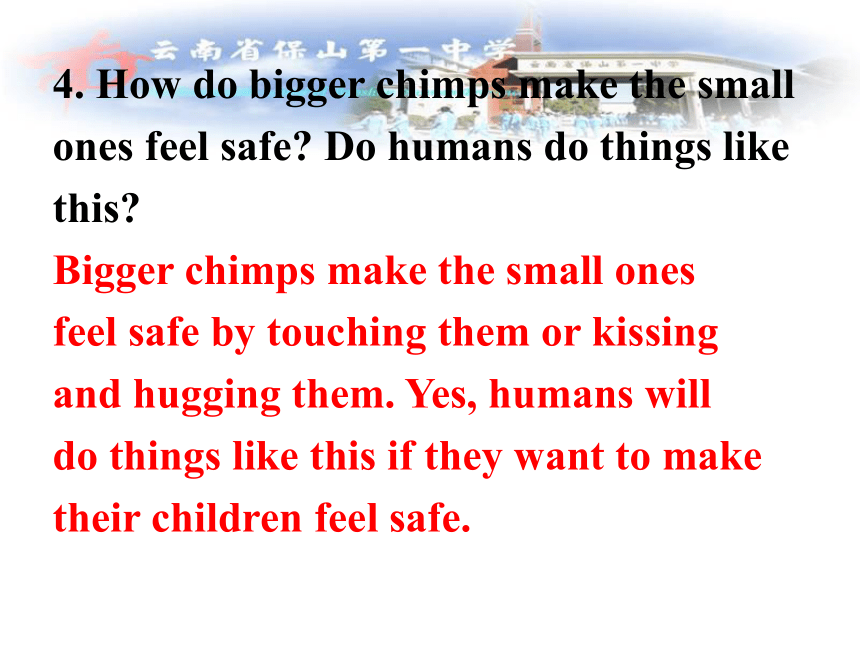
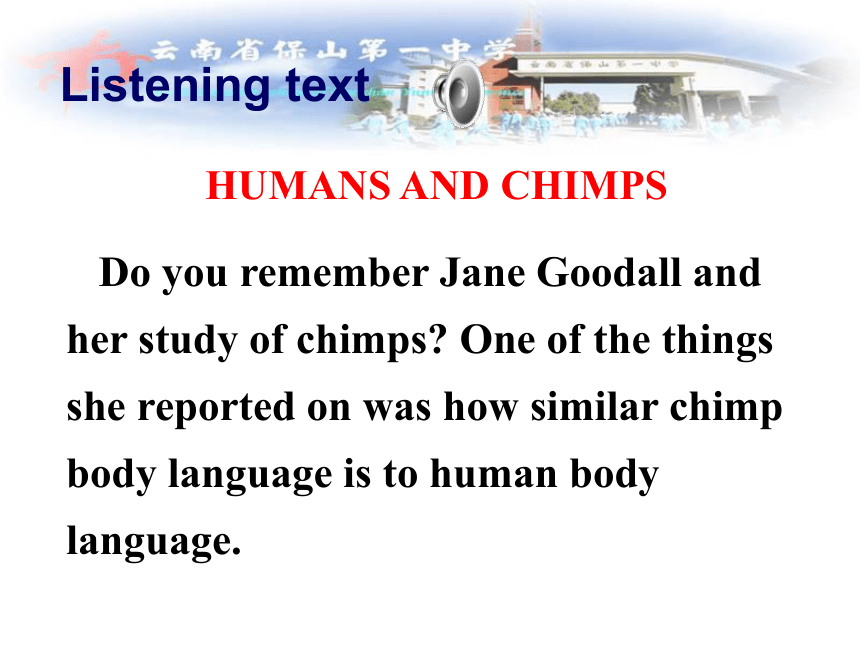
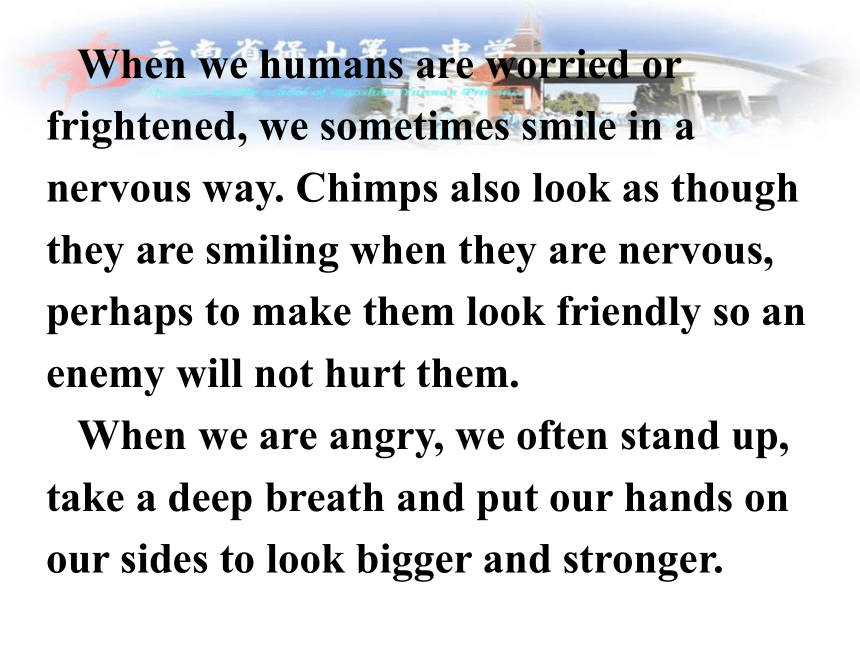
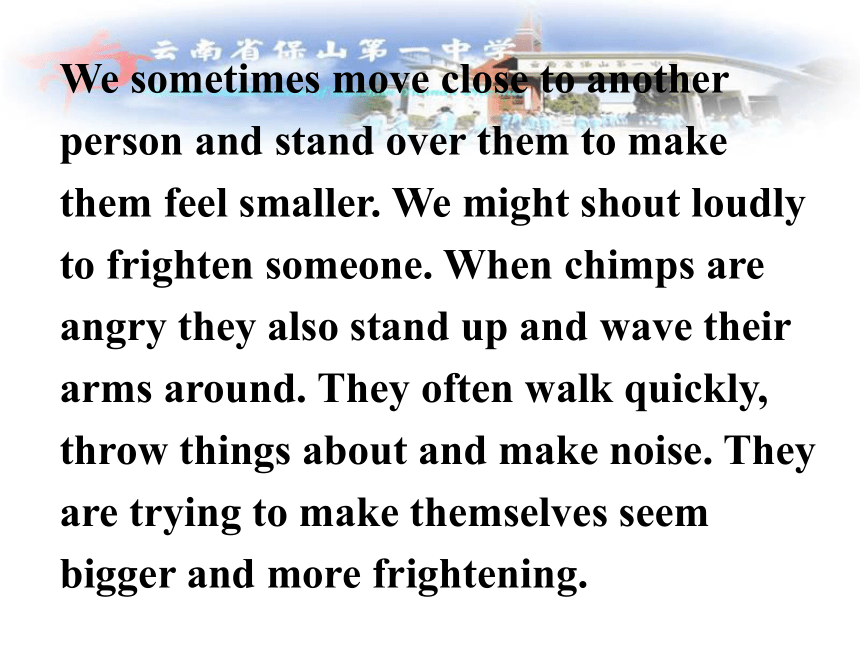
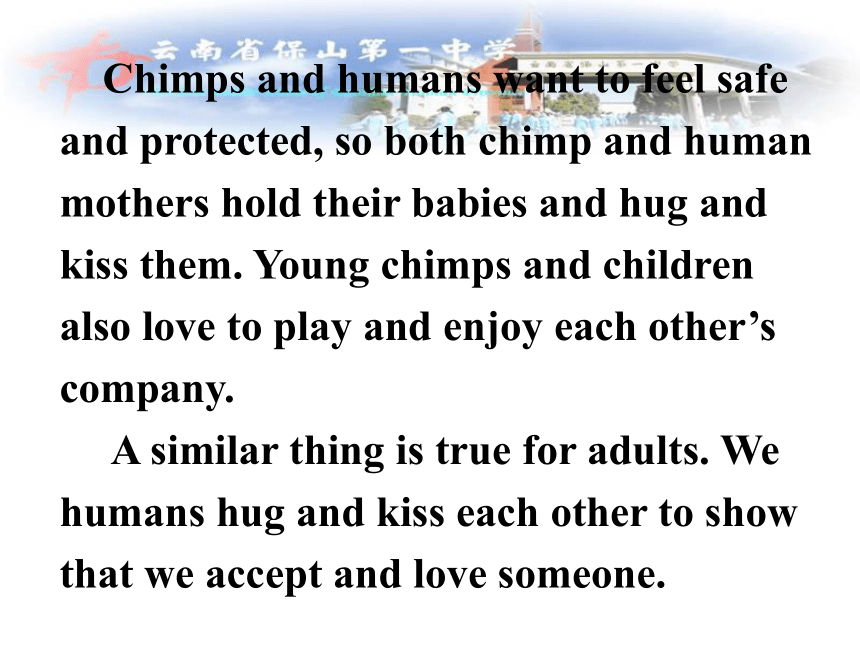
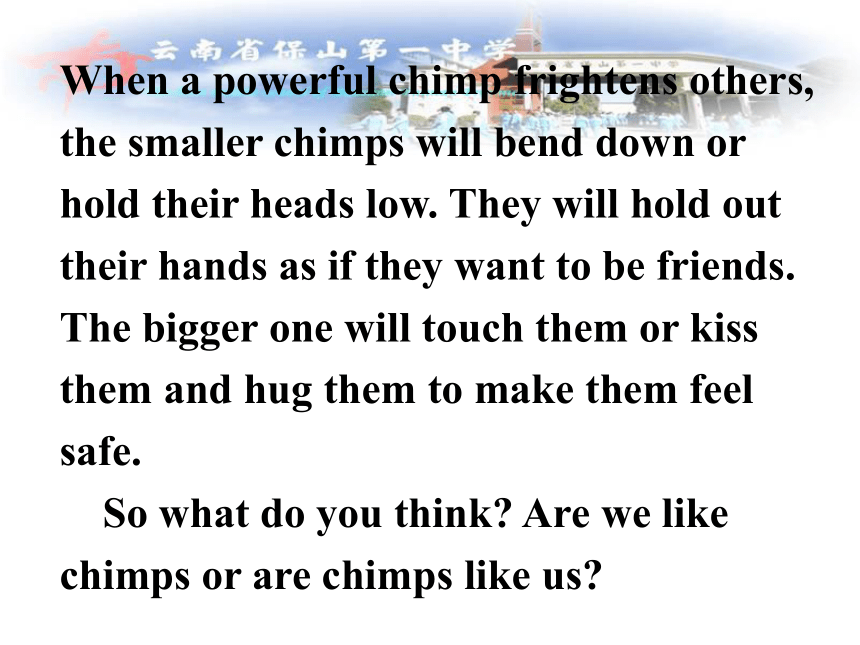
文档简介
课件45张PPT。Unit 4
Body language
Workbook 高一人教新课标版必修四Listening on page 62What do you suppose the listening will be about? 2 True or False? Chimps and humans have the same
body language.
2. Jane says that smiling makes chimps
look more friendly.
3. Humans always shout when they feel
angry.
4. Both chimps and humans want to feel
safe and protected.
5. We often show affection when we like
someone.F TF TT 1. Why do both humans and chimps
smile when they are nervous?
Because they hope an enemy will
not hurt them.Exercise 3:2. What things do both humans and
chimps do to make themselves look
dangerous and frightening?
Both humans and chimps stand up,
and try to make themselves look bigger
and more frightening by waving their
arms around or standing over the others.3. What do both humans and chimps
do to make their babies feel safe?
Both humans and chimps hold their
babies and hug and kiss them to make
them feel safe.4. How do bigger chimps make the small
ones feel safe? Do humans do things like
this?
Bigger chimps make the small ones
feel safe by touching them or kissing
and hugging them. Yes, humans will
do things like this if they want to make
their children feel safe. Do you remember Jane Goodall and her study of chimps? One of the things she reported on was how similar chimp body language is to human body language. HUMANS AND CHIMPS Listening text When we humans are worried or frightened, we sometimes smile in a nervous way. Chimps also look as though they are smiling when they are nervous, perhaps to make them look friendly so an enemy will not hurt them.
When we are angry, we often stand up, take a deep breath and put our hands on our sides to look bigger and stronger.We sometimes move close to another person and stand over them to make them feel smaller. We might shout loudly to frighten someone. When chimps are angry they also stand up and wave their arms around. They often walk quickly, throw things about and make noise. They are trying to make themselves seem bigger and more frightening. Chimps and humans want to feel safe and protected, so both chimp and human mothers hold their babies and hug and kiss them. Young chimps and children also love to play and enjoy each other’s company.
A similar thing is true for adults. We humans hug and kiss each other to show that we accept and love someone.When a powerful chimp frightens others, the smaller chimps will bend down or hold their heads low. They will hold out their hands as if they want to be friends. The bigger one will touch them or kiss them and hug them to make them feel safe.
So what do you think? Are we like chimps or are chimps like us? Look at the pictures and try to guess
what they are communicating from the
body language you see. 2. Listen to the tape and number the
pictures. Listening task on P65123456Shen Lei is meeting Julie, his Canadian
friend, at a restaurant.
SL=SHEN LEI J= JULIE
SL: Hello, Julie! Sorry, I’m late. The traffic was terrible.
J: That’s OK. I just arrived. Be careful – the steps are wet. Don’t slip! LUNCH WITH A FRIEND Listening text SL: Thanks. Let’s go in –it’s raining.
J: Oh, look at the beautiful
decorations and flowers. Is it a
special holiday?
SL: No, but it’s a new restaurant, so
the flowers are here to give
congratulations to the owners and
for good luck.J: What do you mean when you say
“good luck”? Do you mean good
luck to make money or good luck
for other things?
SL: It’s for good business in the restaurant.
Now please come over here.
J: Do you want me to sit down here?
Oh, come and look at the fish.SL: We could have some, if you like.
J: How much is the Mandarin fish? It looks very fancy.
SL: It’s a little expensive, but it’s excellent. I think it’s about thirty-eight yuan.
J: What does that mean? It looks like you are pointing a gun at the waitress.SL: We use our fingers to show numbers.
Don’t you?
J: Yes, but not like that. We use our
fingers for numbers one to nine,
but nothing bigger. We wouldn’t
use our fingers to say “thirty-eight”.The two friends have a big lunch, and when they are finished, they are full. They have eaten too much.J: What’s the matter? Do you have a
stomachache?
SL: No, I just ate too much.
J: I’m full too. I always eat too much
in Chinese restaurants .
SL: Yes, It was a really good meal!The Open Hand-
A Universal SignReading
task P66Look at the pictures below and think:
In what situation do they shake hands? Possible answers on P66: It can be dangerous for you to meet
people you do not know.
2. Many Asian people do not usually
physically touch strangers.
3. If we show an open hand, it means that
we are not holding anything dangerous.4. The right hand is usually used because it
is almost always the stronger.
5. People shake their hands when meeting
people to show that they can be trusted.
6. To show respect Muslim people will touch
their heart and mouth when greeting
someone.Translate the following sentences:
a. 如果他们不来, 怎么办呢?Difficult pointWhat if we don’t know who the new person
is?
What if … 倘使… …将会怎样?What if they do not come?b. 倘使我们不能按时到达,将会怎样?
What if we can’t get there on time?
c. 如果我们在不熟悉的地方碰到陌生人,
那该怎么办?
What if we are meeting a stranger in
an unfamiliar place?
一、单词拼写
1. __________ v. 点头
2. __________ adj. 相似的
3. __________ vt.避免; 消除
4. __________ n.& v.姿势; 做手势
5. __________ n.一致; 协议
6. __________ adj. 地方的; 当地的
7. __________ n. 胸膛
8. __________ n.&vt. 接近; 方法
9. ___________ n.&adj. 一般的; 普通; 将军nodsimilaravoidgestureagreementlocal chestapproachgeneral10. __________ adj. 好奇的
11. __________ n.& adj. 成人的
12. __________ n. 喜剧
13. __________ adj. 较大的;主要的
14. __________ vt. 触摸; 感动
15. __________ n. 陌生人
16. __________ adj. 口头的
17. __________ n. 面颊
18. __________ n. 行为; 动作
19. __________ vt. 惩罚
20. _____________ n. 表达; 表情expressioncuriousadult comedymajortouch stranger spokencheek action punish二、单词运用
When travelling abroad, I’m always
________ about the customs and lifestyle
of ______ people.
2. Our Olympic volunteers, who are
_____________ Chinese people, will go all
out to do a good job.
3. Is that Tom’s friend from USA? I’d like
him to ____________ her to me.curious local representingintroduce 4. At the meeting they discussed three
different a___________ to the study
of maths.
5. He is so tall that his head nearly
t________ the ceiling.
6. I was practically __________ off (睡着)
in that meeting.
ouches pproaches nodding 7. She braked her car hard to avoid _________
(bump) into a car turning suddenly out of a
corner.
8. He raised his hands in a _________ of despair.
9. Children should see Three-D films with the
company of ________.
10. Such wrong behavior should be stopped and
even p_________.unished bumpinggestureadults 三、词语派生
Read the following ____________ and
decide whether they are true or false.
(state)
2. He was a physics _________. That’s to
say, he ____________ in physics. (major)
3. The tiger is a ________________ of the
cat family. (represent)statements majored majorrepresentative 4. The wonderful ______________ (introduce)
of the book arose my __________(curious)
to know more about the story.
5. As we all know, __________ speak louder
than words. (act)
6. Something __________ (speak) hung in the
air between them.
7. Her ________ (face) expression showed that
she did not quite understand what was going on.curiosity introductionactions unspoken facial 8. After a six-day negotiation(谈判), the two
sides finally came to an __________ (agree).
9. I told him I’d meet him here, but perhaps he
______________ (understand) and went
straight to the pub.
10. He entered the room, ________ (close)
followed by the rest of the family.agreement misunderstood closely 四、词组互译
1. 相反 _______________
2. 一般来说 ____________
3. 丢脸 ____________
4. 愿意 ___________________
5. 背对,拒绝帮助 _________________
6. 面部表情 _________________
7. 伸手 ____________
8. 保护……以免受 _______________defend…againston the contraryin generallose facebe willing to (do…)turn one’s back tofacial expressionreach out9. as well ________
10. close to ___________
11. at ease _________
12. nod at _____________
13. not… nor… ____________
14. be likely to do… __________
15. be wrong about __________
16. not all… / all… not __________并非全部也靠近; 即将放松朝……点头既不……也不很可能误解五、词组运用
词组填空 根据句子提供的语境, 从第四大题中
选一个适当的词组并用其适用的形式填空。
Her husband ___________________ her
without a word, which made her very angry.
2. At first we didn’t feel __________ before him
for we had been told that he was a serious person.
3. She felt so cold that she stood __________
the fire.turned his back toat ease close to4. ____________, people prefer to take the
train instead of the airplane to avoid
spending so much on travel.
5. --I hear you are enjoying your new job.
--________________, I found it rather dull.
In generalOn the contrary六、翻译填空 根据汉语意思, 从上述短语中选
一个恰当的词组完成句子。
1. 来自不同文化背景的人会经常误解对方。
People from different cultures can often
__________________ each other.
2. 他对绘画和作曲都有兴趣。
He is interested in painting and composing
_________.be wrong aboutas well 整整一个星期, 他既没给她写信, 也没给
她打电话。
For a whole week he did not write to her
nor give her a call.
2. 并非所有人都喜欢吃辛辣的食物。
Not all people enjoy spicy food.
/All people do not enjoy spicy food.七、句子翻译 从上述短语中选择恰当的短语翻译下列句子。3. 当你走近一个人的时候, 你的面部表情会
表现出你是否友好。(approach; facial;
expression)
When you approach someone, your facial
expression show if you are friendly.
4. 我对他们在舞台上怎样演出喜剧感到
非常好奇。(curious; comedy; represent)
I am very curious about how they
represent the comedy on the stage.
3. 他们很可能产生了误会,而且在这个
问题上也不会达成一致。(likely to;
misunderstand; agreement )
They are likely to misunderstand each
other, and can’t reach an agreement
about the matter.4. 我惊讶地发现这两种相似的手势表达了
如此不同的意见。(similar; gesture;
express)
I am astonished at how the two similar
gestures expressed such different
meanings.5. 一般说来,人们愿意坐火车而不坐飞
机以避过大的开销。( in general;
avoid )
In general, people would rather take a
train than take a plane to avoid
spending so much on travel.Homework Remember the new words and
expressions.
2. Finish the exercises on page 63.
Body language
Workbook 高一人教新课标版必修四Listening on page 62What do you suppose the listening will be about? 2 True or False? Chimps and humans have the same
body language.
2. Jane says that smiling makes chimps
look more friendly.
3. Humans always shout when they feel
angry.
4. Both chimps and humans want to feel
safe and protected.
5. We often show affection when we like
someone.F TF TT 1. Why do both humans and chimps
smile when they are nervous?
Because they hope an enemy will
not hurt them.Exercise 3:2. What things do both humans and
chimps do to make themselves look
dangerous and frightening?
Both humans and chimps stand up,
and try to make themselves look bigger
and more frightening by waving their
arms around or standing over the others.3. What do both humans and chimps
do to make their babies feel safe?
Both humans and chimps hold their
babies and hug and kiss them to make
them feel safe.4. How do bigger chimps make the small
ones feel safe? Do humans do things like
this?
Bigger chimps make the small ones
feel safe by touching them or kissing
and hugging them. Yes, humans will
do things like this if they want to make
their children feel safe. Do you remember Jane Goodall and her study of chimps? One of the things she reported on was how similar chimp body language is to human body language. HUMANS AND CHIMPS Listening text When we humans are worried or frightened, we sometimes smile in a nervous way. Chimps also look as though they are smiling when they are nervous, perhaps to make them look friendly so an enemy will not hurt them.
When we are angry, we often stand up, take a deep breath and put our hands on our sides to look bigger and stronger.We sometimes move close to another person and stand over them to make them feel smaller. We might shout loudly to frighten someone. When chimps are angry they also stand up and wave their arms around. They often walk quickly, throw things about and make noise. They are trying to make themselves seem bigger and more frightening. Chimps and humans want to feel safe and protected, so both chimp and human mothers hold their babies and hug and kiss them. Young chimps and children also love to play and enjoy each other’s company.
A similar thing is true for adults. We humans hug and kiss each other to show that we accept and love someone.When a powerful chimp frightens others, the smaller chimps will bend down or hold their heads low. They will hold out their hands as if they want to be friends. The bigger one will touch them or kiss them and hug them to make them feel safe.
So what do you think? Are we like chimps or are chimps like us? Look at the pictures and try to guess
what they are communicating from the
body language you see. 2. Listen to the tape and number the
pictures. Listening task on P65123456Shen Lei is meeting Julie, his Canadian
friend, at a restaurant.
SL=SHEN LEI J= JULIE
SL: Hello, Julie! Sorry, I’m late. The traffic was terrible.
J: That’s OK. I just arrived. Be careful – the steps are wet. Don’t slip! LUNCH WITH A FRIEND Listening text SL: Thanks. Let’s go in –it’s raining.
J: Oh, look at the beautiful
decorations and flowers. Is it a
special holiday?
SL: No, but it’s a new restaurant, so
the flowers are here to give
congratulations to the owners and
for good luck.J: What do you mean when you say
“good luck”? Do you mean good
luck to make money or good luck
for other things?
SL: It’s for good business in the restaurant.
Now please come over here.
J: Do you want me to sit down here?
Oh, come and look at the fish.SL: We could have some, if you like.
J: How much is the Mandarin fish? It looks very fancy.
SL: It’s a little expensive, but it’s excellent. I think it’s about thirty-eight yuan.
J: What does that mean? It looks like you are pointing a gun at the waitress.SL: We use our fingers to show numbers.
Don’t you?
J: Yes, but not like that. We use our
fingers for numbers one to nine,
but nothing bigger. We wouldn’t
use our fingers to say “thirty-eight”.The two friends have a big lunch, and when they are finished, they are full. They have eaten too much.J: What’s the matter? Do you have a
stomachache?
SL: No, I just ate too much.
J: I’m full too. I always eat too much
in Chinese restaurants .
SL: Yes, It was a really good meal!The Open Hand-
A Universal SignReading
task P66Look at the pictures below and think:
In what situation do they shake hands? Possible answers on P66: It can be dangerous for you to meet
people you do not know.
2. Many Asian people do not usually
physically touch strangers.
3. If we show an open hand, it means that
we are not holding anything dangerous.4. The right hand is usually used because it
is almost always the stronger.
5. People shake their hands when meeting
people to show that they can be trusted.
6. To show respect Muslim people will touch
their heart and mouth when greeting
someone.Translate the following sentences:
a. 如果他们不来, 怎么办呢?Difficult pointWhat if we don’t know who the new person
is?
What if … 倘使… …将会怎样?What if they do not come?b. 倘使我们不能按时到达,将会怎样?
What if we can’t get there on time?
c. 如果我们在不熟悉的地方碰到陌生人,
那该怎么办?
What if we are meeting a stranger in
an unfamiliar place?
一、单词拼写
1. __________ v. 点头
2. __________ adj. 相似的
3. __________ vt.避免; 消除
4. __________ n.& v.姿势; 做手势
5. __________ n.一致; 协议
6. __________ adj. 地方的; 当地的
7. __________ n. 胸膛
8. __________ n.&vt. 接近; 方法
9. ___________ n.&adj. 一般的; 普通; 将军nodsimilaravoidgestureagreementlocal chestapproachgeneral10. __________ adj. 好奇的
11. __________ n.& adj. 成人的
12. __________ n. 喜剧
13. __________ adj. 较大的;主要的
14. __________ vt. 触摸; 感动
15. __________ n. 陌生人
16. __________ adj. 口头的
17. __________ n. 面颊
18. __________ n. 行为; 动作
19. __________ vt. 惩罚
20. _____________ n. 表达; 表情expressioncuriousadult comedymajortouch stranger spokencheek action punish二、单词运用
When travelling abroad, I’m always
________ about the customs and lifestyle
of ______ people.
2. Our Olympic volunteers, who are
_____________ Chinese people, will go all
out to do a good job.
3. Is that Tom’s friend from USA? I’d like
him to ____________ her to me.curious local representingintroduce 4. At the meeting they discussed three
different a___________ to the study
of maths.
5. He is so tall that his head nearly
t________ the ceiling.
6. I was practically __________ off (睡着)
in that meeting.
ouches pproaches nodding 7. She braked her car hard to avoid _________
(bump) into a car turning suddenly out of a
corner.
8. He raised his hands in a _________ of despair.
9. Children should see Three-D films with the
company of ________.
10. Such wrong behavior should be stopped and
even p_________.unished bumpinggestureadults 三、词语派生
Read the following ____________ and
decide whether they are true or false.
(state)
2. He was a physics _________. That’s to
say, he ____________ in physics. (major)
3. The tiger is a ________________ of the
cat family. (represent)statements majored majorrepresentative 4. The wonderful ______________ (introduce)
of the book arose my __________(curious)
to know more about the story.
5. As we all know, __________ speak louder
than words. (act)
6. Something __________ (speak) hung in the
air between them.
7. Her ________ (face) expression showed that
she did not quite understand what was going on.curiosity introductionactions unspoken facial 8. After a six-day negotiation(谈判), the two
sides finally came to an __________ (agree).
9. I told him I’d meet him here, but perhaps he
______________ (understand) and went
straight to the pub.
10. He entered the room, ________ (close)
followed by the rest of the family.agreement misunderstood closely 四、词组互译
1. 相反 _______________
2. 一般来说 ____________
3. 丢脸 ____________
4. 愿意 ___________________
5. 背对,拒绝帮助 _________________
6. 面部表情 _________________
7. 伸手 ____________
8. 保护……以免受 _______________defend…againston the contraryin generallose facebe willing to (do…)turn one’s back tofacial expressionreach out9. as well ________
10. close to ___________
11. at ease _________
12. nod at _____________
13. not… nor… ____________
14. be likely to do… __________
15. be wrong about __________
16. not all… / all… not __________并非全部也靠近; 即将放松朝……点头既不……也不很可能误解五、词组运用
词组填空 根据句子提供的语境, 从第四大题中
选一个适当的词组并用其适用的形式填空。
Her husband ___________________ her
without a word, which made her very angry.
2. At first we didn’t feel __________ before him
for we had been told that he was a serious person.
3. She felt so cold that she stood __________
the fire.turned his back toat ease close to4. ____________, people prefer to take the
train instead of the airplane to avoid
spending so much on travel.
5. --I hear you are enjoying your new job.
--________________, I found it rather dull.
In generalOn the contrary六、翻译填空 根据汉语意思, 从上述短语中选
一个恰当的词组完成句子。
1. 来自不同文化背景的人会经常误解对方。
People from different cultures can often
__________________ each other.
2. 他对绘画和作曲都有兴趣。
He is interested in painting and composing
_________.be wrong aboutas well 整整一个星期, 他既没给她写信, 也没给
她打电话。
For a whole week he did not write to her
nor give her a call.
2. 并非所有人都喜欢吃辛辣的食物。
Not all people enjoy spicy food.
/All people do not enjoy spicy food.七、句子翻译 从上述短语中选择恰当的短语翻译下列句子。3. 当你走近一个人的时候, 你的面部表情会
表现出你是否友好。(approach; facial;
expression)
When you approach someone, your facial
expression show if you are friendly.
4. 我对他们在舞台上怎样演出喜剧感到
非常好奇。(curious; comedy; represent)
I am very curious about how they
represent the comedy on the stage.
3. 他们很可能产生了误会,而且在这个
问题上也不会达成一致。(likely to;
misunderstand; agreement )
They are likely to misunderstand each
other, and can’t reach an agreement
about the matter.4. 我惊讶地发现这两种相似的手势表达了
如此不同的意见。(similar; gesture;
express)
I am astonished at how the two similar
gestures expressed such different
meanings.5. 一般说来,人们愿意坐火车而不坐飞
机以避过大的开销。( in general;
avoid )
In general, people would rather take a
train than take a plane to avoid
spending so much on travel.Homework Remember the new words and
expressions.
2. Finish the exercises on page 63.
同课章节目录
